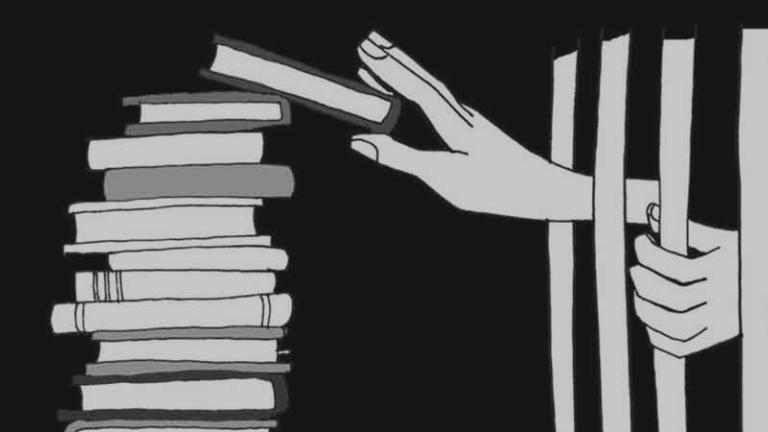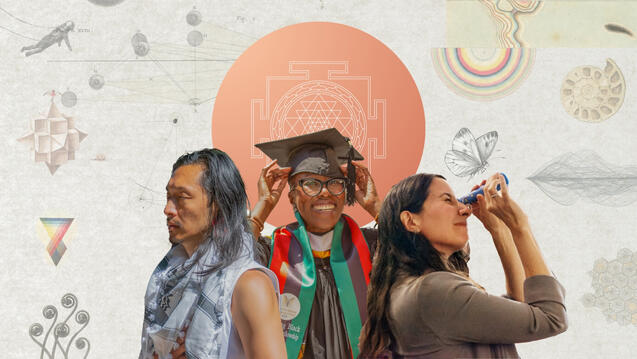Transformative Leadership alum Cynthia Huie, M.A. '24, brings creativity and connection to the San Francisco small-business community.

CIIS' Arc of Justice Scholarship Opens Minds Once Trapped Behind Bars
CIIS graduate Luis Aroche knows firsthand what an education means to a person caught up in the cycle of violence and incarceration: Everything.
CIIS graduate Luis Aroche knows firsthand what an education means to a person caught up in the cycle of violence and incarceration: Everything.
“Without an education, you’re lacking the basic skills to navigate life,” says Aroche, who grew up in San Francisco’s Mission District. “You don’t know how to express yourself, how to analyze. Education gives you identity. It reinforces who you are, not where you came from.”
Determined to turn his life around, Aroche had tried other re-entry programs at colleges and universities in the Bay Area. But it was his meeting with CIIS that stuck the right chord. “CIIS was really welcoming,” he said. “They gave me the feeling that ‘wow, they care.’”
Today, Aroche is a year away from his master’s degree in public administration at the University of San Francisco—and CIIS has expanded the reach of its Bachelor of Arts Completion program to embrace men and women who, like Aroche, are seeking a solid footing in society after spending in some cases decades behind prison walls. It is a pioneering focus on social and socioeconomic inclusion that recognizes the need for—and, importantly, the social value of—a higher education for the formerly incarcerated.
“The CIIS orientation toward social justice, critical thinking, and personal transformation is a great fit for these students,” says Michelle Eng, Dean of Undergraduate Studies. “We are committed to this. We’re putting our resources behind it.”
Launched two years ago, it is funded through the Arc of Justice Scholarship awards, which allow students like Richard Lindsey and Nate Williams—the first scholarship recipients—to finish their B.A. degrees in interdisciplinary studies. Both Williams and Lindsey who are graduating in December 2014 and 2015, respectively, reached these milestones after spending more than 25 years each in prison, where, as the scholarship requires, they completed two years of undergraduate work.
As scholarship recipients, the work they do within the Bachelor of Arts Completion program is no different from what their fellow students experience at CIIS: an integrated, holistic liberal arts education that reflects the values of collaboration, equity, and justice.
For Lindsey, the greatest benefit of the scholarship was the “self-esteem, a sense of well-being” that came with his degree. “I was coming from a place of darkness,” he says of his years in San Quentin. “I didn’t feel good about myself. I like who I am today. I have a new way to define myself, a new perspective on how to act in the world.”
An Arc of Justice fundraising benefit on October 28, featuring the provocative documentary film “Unlikely Friends: Total Strangers, Brutal Crimes,” aims to drive home the value of the CIIS re-entry program, for scholarship recipients like Lindsey, but importantly for society at large, both through the film and a panel discussion that explores pathways for championing not retribution, but humanity within our prison systems and communities.
A Transformative Pipeline at CIIS
The event, co-sponsored by CIIS and Insight Prison Project (IPP), will raise funds for part of CIIS’s Arc of Justice drive to finance scholarships for 10 re-entry students, and IPP’s work to foster insight and lasting behavioral change by providing rehabilitative tools to prisoners in California correctional systems.
IPP provides a number of restorative justice programs in prisons across California, including its Victim Offender Education Group (VOEG), which is roughly a 52-week curriculum offered to incarcerated individuals, that helps them uncover and understand the deeply personal and often traumatic circumstances that propelled them into the criminal justice system.
VOEG not only fosters lasting behavioral change for offenders who have committed violent crimes, but also it creates unique opportunities for victims to participate in our criminal justice system—an opportunity that isn’t available to crime survivors outside of Restorative Justice programs like IPP.
CIIS and IPP came together in large part through the passionate work of Sonya Shah and her dedication to restorative justice, which seeks to address society’s ills by affecting change at the community and, in the case of criminal justice, at the individual, victim–perpetuator levels.
An associate professor in CIIS' Bachelor of Arts Completion program and also the director of the Justice Program at IPP, where she’s responsible for the oversight of VOEG, Shah connected the dots: a link up between IPP’s groundbreaking, rigorous in-prison work and the acclaimed BAC program was a natural pairing—a pipeline that completes the work these men and women have completed psychologically, and a means, believe Shah and CIIS, to initiate positive social change.
As she advises IPP’s San Quentin participants, in terms of the next step once their cell doors open, “CIIS wants to play a role in your role as a returning citizen.”
Through her IPP work, Shah has seen, as has her colleague and IPP Interim Executive Director Billie Mizell, the often-remarkable transformations that occur when prisoners begin to unearth the reasons behind their destructive actions.
“The curriculum starts with accountability and a crime impact statement, and ends with a victim/offender dialogue” says Mizell of the emotionally intensive VOEG program. The program isn’t easy, but through the course of the curriculum, which covers topics like guilt and shame, as well as forgiveness, the men come to a place of deep healing. They’re transformed. You can see it.”
"I’m so excited about what CIIS is doing,” adds Mizell, who along with Shah, is one of the evening’s speakers. “It means that when these men leave prison, they have a chance to break the cycle of crime and incarceration because these re-entry services are available.
Doing that tough inner work is a prerequisite for the CIIS re-entry scholarship. As CIIS’s Julie Pofsky, assistant director of Development, advises,
We want to break down the barriers. These men and women deserve to be contributing members of society. But it takes work, and this opportunity is for people who have done the work."
The Factor of One
Leslie Neale’s film, “Unlikely Friends,” examines the power of forgiveness between a crime victim and the perpetrator, not re-entry education. But for viewers at the upcoming benefit, its message will echo what CIIS and IPP are seeking as part of their collaboration—how to heal a community from the individual up.
“We’re all in this together, that’s my theme,” says Neale of her film. “And if we’re all in this together, we need to figure out how to do (the healing) together.”
One way is the Bachelor of Arts Completion way. Not only are re-entry students more than willing, and primed, to do the work that an education requires, “they’re ready to move to the next step when they get out,” says Eng. With the Arc scholarship, they’ll finish their degree, as do all Bachelor of Arts Completion students, in three semesters, or one calendar year.
CIIS gives them the needed launching pad to do what CIIS alum Aroche calls “more than a second chance. It’s an investment that will give back ten-fold to society.”
“People coming out of prison are determined to change their lives,” advises Aroche. “They’re energetic learners, they have persistence.” And more than likely, they will once again be on the streets—but this time, he assures, “as ambassadors to the community and a bridge for law enforcement.”
Aroche speaks from experience when he says that the vast majority of former prisoners go into nonprofit work. “They have a huge desire and yearning to give back to society. They don’t go into the business sector. They don’t want to be another Donald Trump.”
After his years in and out of juvenile detention centers, Aroche worked with disadvantaged youth until he was hired as an “alternative sentencing planner” within the San Francisco District Attorney’s Office, where he helps determine which offenders are most likely to benefit from rehabilitation programs rather than incarceration.
The first program of its kind in the state, it is part of a growing trend to rethink the American criminal justice system and its wholesale incarceration of men and women, regardless of the severity of their crime. California’s Proposition 47, which seeks to reduce criminal charges for nonviolent crimes, is a case in point.
Society is looking at these traditional methods of law and order and realizing that they’re aren’t working, says Aroche.
The same holds true for what happens once the incarcerated are freed. Without an educational compass, they’re lost in their past—and most often return to what they know, crime and prison. “It’s a revolving door,” says Aroche.
But education, he says, “puts them on the right path. They can dig in and look deep into themselves, at the muck and anger and deal with it. Education unlocks the mind... It gives them hope that there will be a brighter day.”
Learn more about Insight Prison Project
Make a tax-deductible donation to the scholarship fund for formerly incarcerated men and women online, or make your check payable to CIIS and write BAC ARC OF JUSTICE SCHOLARSHIPS in the “For” or “Memo” field.
Please mail donations to: Dorotea Reyna, Vice President of Development, California Institute of Integral Studies, 1453 Mission Street San Francisco CA 94103
Related Academic Program
Related News
A panel hosted by the Department of Human Sexuality gathered notable alumni from the Ph.D. program to discuss their change-making work and research.
At each CIIS Open House event, a community panel of faculty and alumni discusses what drew them to CIIS and their experiences at the University.



